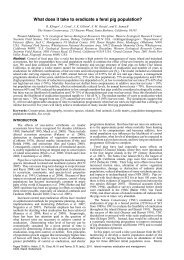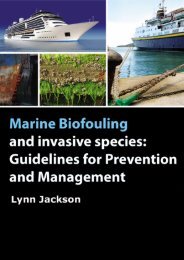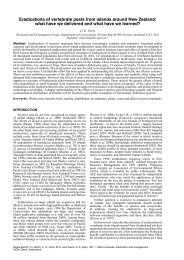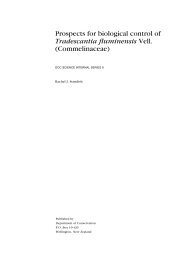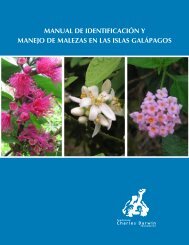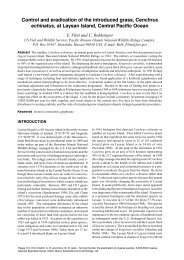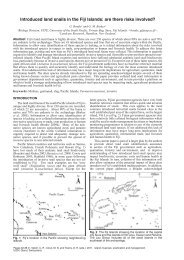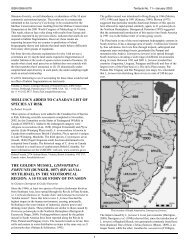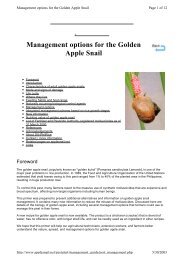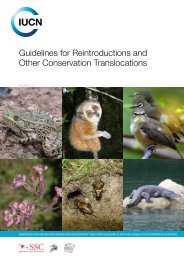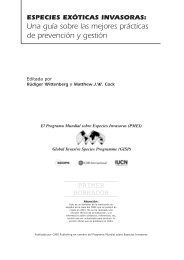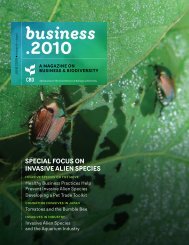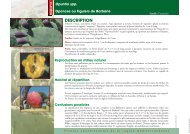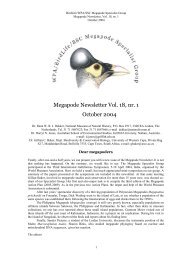Aliens Newsletter - ISSG
Aliens Newsletter - ISSG
Aliens Newsletter - ISSG
Create successful ePaper yourself
Turn your PDF publications into a flip-book with our unique Google optimized e-Paper software.
Managing Biodiversity Risks of Biofuels – Biological Invasions<br />
Geoffrey W. Howard<br />
The world-wide movement to produce biofuels as<br />
substitutes for reducing stocks of fossil fuels has<br />
resulted in many plantations in developing<br />
countries of introduced plants used as feedstocks<br />
for production systems. Amongst the negative<br />
impacts of establishing biofuel production<br />
systems in single-species plantations is the<br />
probability that they will result in biological<br />
invasions by the introduced plants if they<br />
“escape” from the production area. IUCN<br />
initiated a programme to investigate the<br />
likelihood of this happening in Eastern and<br />
Southern Africa and, after two significant<br />
consultations with biofuel producers, government<br />
regulators, invasive species experts and<br />
concerned conservationists, developed a series of<br />
recommendations on how to reduce or eliminate<br />
the risk of possible invasions by the introduced<br />
plants. The result was a series of<br />
recommendations and best practice which will<br />
enhance the existing advice on prevention of<br />
invasions of the Roundtable on Sustainable<br />
Biofuels. The process and outputs of those<br />
consultations are described and links to their<br />
details provided.<br />
Introduction and background<br />
During the 9 th Conference of Parties of the Convention<br />
on Biological Diversity (held in Bonn, Germany<br />
in May, 2008), the Global Invasive Species Programme<br />
(GISP) hosted a Press Briefing on Biofuels<br />
and Invasive Species and released a small information<br />
document entitled “Biofuel Crops and the<br />
Use of Non-Native Species”. The gathering was addressed<br />
by the Chairman of the GISP Board, Dr<br />
Dennis Rangi, and by GISP partners from CABI,<br />
IUCN and The Nature Conservancy. They presented<br />
possible problems of biological invasions from<br />
plants introduced from outside a particular area that<br />
would be used as feedstocks for biofuel plantations<br />
– especially in developing countries, and then contributed<br />
some solutions to this problem. The result<br />
was a plethora of press articles across the world and<br />
much debate about whether this was really a significant<br />
risk and what could be done about it – especially<br />
as large areas of land were being purchased<br />
in Africa, Asia and Latin America for the development<br />
of biofuel plantations at that time. GISP responded<br />
by publicising the information document<br />
(GISP, 2008) and encouraging the preparation of a<br />
technical paper on the subject which was subsequently<br />
published in Biodiversity Business<br />
(Howard G & Ziller S, 2008) later that year. This<br />
presented the possible problems as well as ways to<br />
avoid them and suggested that Weed Risk Assessment<br />
should become a standard practice when deciding<br />
upon the kind of biofuel feedstock to select<br />
for a production system.<br />
IUCN, through its Business and Biodiversity Programme<br />
and its Invasive Species Initiative, decided<br />
to take this further and to assist the Roundtable<br />
on Sustainable Biofuels to develop specific guidance<br />
for the selection and management of biofuel plantations<br />
to avoid the possibility of plant invasions<br />
from the feedstocks involved. A proposal was made<br />
to the David and Lucile Packard Foundation which<br />
generously agreed to fund a one-year set of activities<br />
to prepare some of the guidance suggested. This<br />
was to be done by gathering information and advice<br />
and discussing this in the Eastern and Southern<br />
African region with interested parties, experts and<br />
biofuel producers. This region was chosen for the<br />
discussions because of the rapidly expanding biofuel<br />
industry developing in that part of Africa at the<br />
time.<br />
The Process – Workshop One<br />
The first activity of the one-year project was to commission<br />
a background document which would define<br />
the terms and the topic and give general information<br />
necessary for an informed discussion about<br />
this topic. Dr John Mauremootoo was asked to prepare<br />
such a document (IUCN, 2009a) which was finalized<br />
in March, 2009 and distributed to the participants<br />
who had meanwhile been invited to the first<br />
<strong>Aliens</strong> 25



